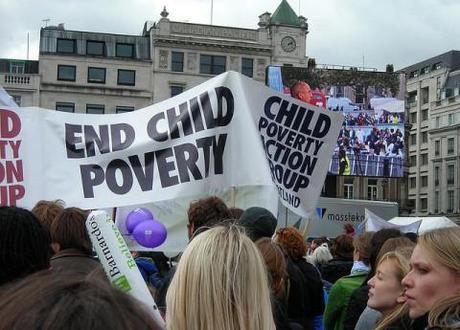 Protesters at an end child poverty rally. Photo credit: Need not Greed http://flic.kr/p/66AYsu
Protesters at an end child poverty rally. Photo credit: Need not Greed http://flic.kr/p/66AYsu
The background
The leading charity Save The Children, best known for giving aid to poor families overseas is, for the first time in its 93-year history, highlighting the problems children face in the UK. It Shouldn’t Happen Here is the charities’ first campaign to raise money for British children.
The charity, which is looking to raise £500,000 to fund its work in Britain, says the children of Britain are bearing the brunt of the double-dip recession with some of the poorest going without at least one hot meal a day. The campaign urges the government to focus on benefits for low-paid families and ask employers to pay a living wage. In response, the government has re-stated its commitment to eradicating child poverty.
The study draws on Institute of Fiscal Studies (IFS) figures which estimate that there are 3.5 million children living in poverty in the UK and predict a steep rise in the numbers in coming years, reported the BBC. The charity defines living in poverty as having a family income of less than £17,000 a year.
Justin Forsyth, Save the Children’s chief executive, quoted by the BBC, said: “Poverty is tearing families apart, with parents buckling under the pressure of mounting bills and children seeing their parents argue more about money.” He added: “Given that most children living in poverty have at least one parent in work; it is appalling that those parents can’t earn enough to give themselves and their kids a decent life.”
The findings
Researchers for Save the Children survey surveyed more than 1,500 children aged eight to 16 and more than 5,000 parents, focusing on the lowest income groups. More than half the parents in poverty surveyed (61 percent) said they had cut back on what they ate and more than a quarter (26 percent) had skipped meals in the past year.
Get real. There’s no real poverty in the UK
At The Daily Mail, Douglas Murray, associate Director of the Henry Jackson Society think-tank, questioned “how can Save The Children equate British families with the starving poor of Africa?” Murray insisted that, “the fact is that thanks to the Welfare State and our benefits system, no child in Britain can possibly be said to be living in that kind of poverty – without food or heating – unless their parents are grossly misusing their handouts. Of course, this is nothing compared to the real poverty experienced by millions of children in Africa and around the world. Save The Children has redefined ‘poverty’ to mean not somebody who is literally starving but somebody who is in ‘want’. Yes, many families in Britain worry about whether they are going to be able to pay the bills. It is a strain that affects us all, especially now when households are stretched by unemployment, by a steeply rising cost of living, and terrible interest rates charged by loan sharks. But worrying about whether we can pay the bills does not mean we are stuck in ‘poverty’.”
At The Daily Mail, Douglas Murray argued that to suggest that “the situation here in Britain” is “in any way analogous with the situation of starving children in Africa is not just stretching credulity, it is actually obscene.”
Coalition government should be ashamed
An editorial in the left-wing Morning Star newspaper said “Conservative coalition ministers should hang their heads in shame over the revelation that Save the Children is expanding its two anti-poverty programmes in Britain, one of the richest countries in the world … No-one would suggest that the levels of poverty and hardship seen in parts of Africa are replicated here. But this is not to diminish the very real problems experienced in this country where one in eight of the poorest children regularly experience days without a hot meal and one in 10 parents skimp on their own nutrition to feed their children.” “The most scandalous aspect of these shocking revelations is that most children living through these hardships belong to families where at least one parent works, destroying the stereotypes that financial hardship is the result of indolence and that having a job is an antidote to poverty,” boomed the newspaper.
Save the Children should be ashamed
“Save the Children should be ashamed of this propaganda,” boomed Ross Clark at The Times (£), who insisted that the charity’s campaign is “political.” He pointed out that “not once during the Spanish flu, the 1930s depression or the Second World War did Save the Children see the need to raise money for British children, but come the evil coalition cuts and Britain is suddenly reduced to a Third World country with millions of children starving beneath our noses … This isn’t really a charity campaign, of course; it is a political one. Save the Children has evolved from an aid charity into a political pressure group against cuts.”
“This propaganda is aided by the Government’s daft definition of child poverty: it encompasses any child living in a family on less than 60 per cent of median household income (50 per cent for “severe poverty”). This isn’t a measure of poverty but equality, and produces bizarre outcomes,” criticised Clark, who noted that 2010-11 “shows up as a hugely successful year, with 300,000 children apparently lifted out of poverty. But that wasn’t because anyone had more to eat; it was because median incomes fell, thanks to the recession.”
More on society
- Is a benefits cap a good idea?
- The Spartacus reform on Disability Allowance
- Is the UK economy doomed?
- British high streets at ‘crisis point’

